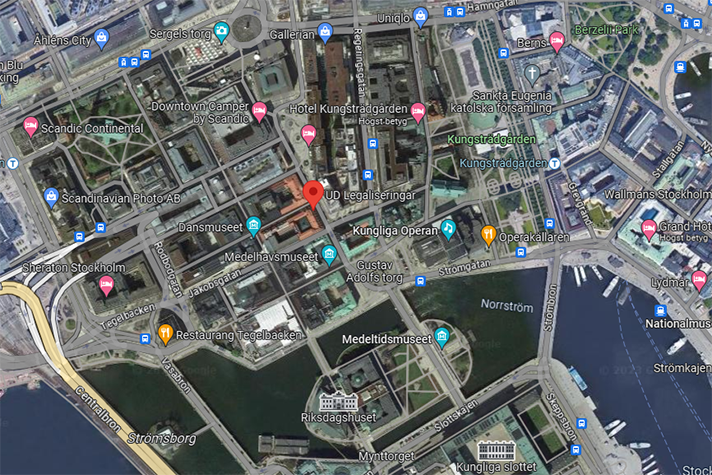Ministry for Foreign Affairs legalisations
Updated
The Ministry for Foreign Affairs legalises Swedish documents that are requested by or are to be presented to a foreign authority. A legalisation certificate is a stamp confirming that a signature on a document is genuine. A legalisation can be done in Swedish, English, French or Spanish.
A legalisation means that the Ministry for Foreign Affairs confirms that a signature and seal/stamp on a Swedish document is genuine and verifies the capacity in which the signatory signed it. Accordingly, a legalisation has no bearing on the content of the document. Once the Ministry for Foreign Affairs has legalised the document, a legalisation must normally also be authenticated by the foreign embassy in Stockholm representing the country where the document is to be used.
The Ministry for Foreign Affairs does not issue apostilles, but instead refers to notaries public.
- Official documents from a Swedish Government agency
- Extracts from registers and other documents issued by the Swedish Police authorities
- Documents from the National Archives and the regional state archives
- Marriage certificates from civil marriage officiants
- Grades/certificates from higher education institution
- Swedish documents signed by a notary public
- Swedish documents (invoices, VAT reports, certificates of origin, registration of trademark and other import and export documents) signed by a Swedish chamber of commerce
- Documents not issued in Sweden that have been certified by the issuing country's embassy/consulate in Sweden
- Documents from the Swedish Social Insurance Agency and the
- Swedish Public Employment Service
- Signatures by medical doctors, licensed pharmacists, licensed veterinarians, midwives and other professions licensed by the
- National Board of Health and Welfare or the Swedish Board of Agriculture
- Translations done by an authorized public translator certified by Kammarkollegiet (Legal, Financial and Administrative Services Agency). A list of authorized translators is available on the website of Kammarkollegiet
The Legal, Financial and Administrative Services Agency website
- Copies lacking an original signature
- Documents issued by private persons
- Invoices, VAT reports, certificates of origin, registration of trademarks and other import and export documents (these can also be authenticated by a chamber of commerce)
- Powers of attorney
- Documents from banks, lawyers, private companies
- Documents from county and municipal archives
- Marriage certificates from non-civil marriage officiants (Church of Sweden, foreign faith communities in Sweden)
- Grades/documents from schools other than higher education institutions
- Documents translated by a translator not authorized by Kammarkollegiet (Legal, Financial and Administrative Services Agency).
The Swedish Ministry for Foreign Affairs does not issue apostilles. As of 1 January 2005, in Sweden, only Notaries Public have the authority to issue an apostille. When an apostille stamp is attached to a document, it is exempted from all forms of authentication, i.e. no further validation/legalisation is required. A list of countries that have signed the Apostille Convention is available on the Hague Conference website.
Pursuant to an EU Regulation which promotes the free movement of citizens, certain public documents and their certified copies are exempt from legalisation and the apostille formality within the EU from 16 February 2019.
Each legalisation, i.e. each signature including a seal or stamp on a document to be certified, costs SEK 225.
There are two ways to have your documents legalised by MFA Legalisations.
Firstly, you can visit our office at Malmtorgsgatan 3 A in Stockholm. The legalisation is completed while you wait (maximum six legalisations per visit). You do not personally need to visit for legalisations; you may send someone else on your behalf. The fee is to be paid by charge or debit card at the time of the visit.
More than six documents submitted in person can be picked up after a few working days.
Secondly, the document may be sent to the Ministry for Foreign Affairs by post, addressed to:
Utrikesdepartementet
UD Legaliseringar
103 39 Stockholm
Remember to include your name, address, a mobile number, if you have one, and indicate in what country you you are going to use the documents. Legalisations can be done in Swedish, English, French or Spanish.
Legalised documents are returned only to recipients in Sweden. Our processing time is approximately one week, excluding time for the postal mail.
Please do not enclose any cash when sending documents by post. Your document will be returned cash-on-delivery, which is to say that payment is made when you collect the letter at your postal service point. A fee of SEK 60 is added for cash-on-delivery.
If you do not collect your document and want the Ministry for Foreign Affairs to resend it to you, an additional cash-on-delivery fee of SEK 60 is payable.
Legalised documents that have not been collected within six months are invalidated/destroyed.
No, the Ministry for Foreign Affairs cannot determine whether a document needs to be legalised. Only the foreign authority can answer this question.
No, documents cannot be translated by the Ministry for Foreign Affairs.

Contact information
Call us:
Phone +46 8 405 51 00
Tuesday, 13.00-15.00
Visit us:
Malmtorgsgatan 3 A, Stockholm
Monday–Thursday, 09.00–11.00
Postal address:
MFA Legalisations Office
S-103 39 Stockholm
Sweden
E-mail address:
[email protected]

 X
X